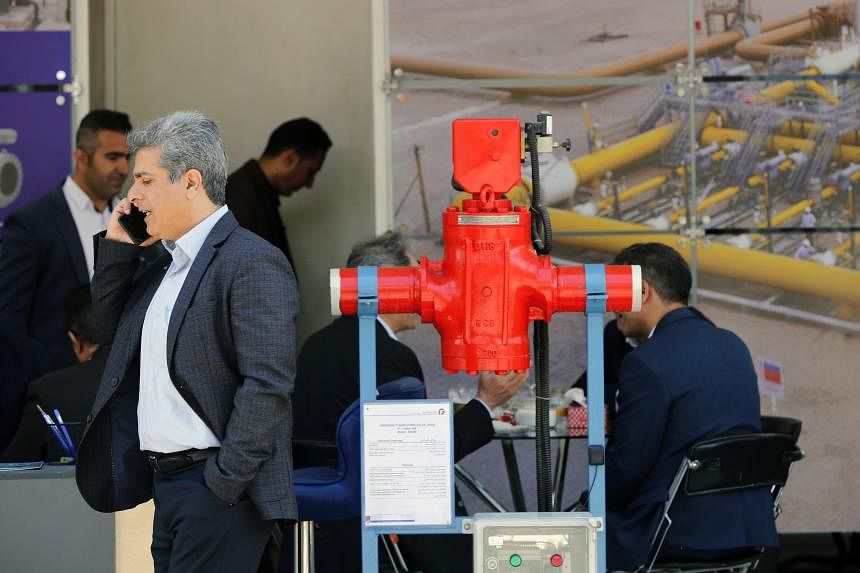
KUALA LUMPUR – Malaysia will recognise sanctions imposed by the United Nations only and not by individual countries, said Home Minister Saifuddin Nasution Ismail on May 9, following claims by a top US official that Iran has relied on Malaysian service providers to sell US-sanctioned oil in the region.
“I emphasised that we will only recognise sanctions if they are imposed by the United Nations Security Council.
“The delegation from the US respected our stance,” Datuk Seri Saifuddin told reporters following a meeting with the US Treasury Department’s top sanctions official Brian Nelson, who was visiting Kuala Lumpur.
Washington has imposed sanctions on Iran and its proxies, including on the sale of Iranian oil, aimed at choking money flows that it claimed were being used to foment instability in the Middle East.
Mr Nelson, speaking to the local media after the meeting, said of the Washington claims against Malaysian service providers: “I would only say we have seen and we’ve promulgated some sort of guidance to the (Malaysian) marine sector about the type of services that they are engaging in.
“These are ship-to-ship transfers, particularly at night, which we see from time to time.
“They are really designed to obfuscate the origin of the commodity, in this case, Iranian oil,” he told Malaysiakini.
Mr Nelson had said that the capacity of Iran to move its oil depended on parties such as port administrators and tugboat operators.
“Typical markers that we see are like when they turn off their location device and when they’re trying to obscure the name of the ship, or they falsify or forge critical documents about the commodities that were issued,” he added.
A recent Reuters report cited an unnamed senior US Treasury official as saying that there has been an uptick in money moving to Iran and its proxies, including Hamas, through the Malaysian financial system.
In the meeting with Mr Nelson, Mr Saifuddin said he underlined Malaysia’s commitment to combating terrorism financing, with a clear strategic plan to tackle illicit financing activities and money laundering.
The minister also acknowledged concerns raised by US officials over possible money laundering activities involving certain individuals and organisations in Malaysia with purported ties to Iran and its proxies like Hamas, and said these needed verification.
Malaysian government spokesman Fahmi Fadzil, speaking to reporters on May 8, said the country would comply with UN sanctions, but not necessarily with those imposed by individual countries.
“We want to assert that Malaysia, as a sovereign nation, we comply with UN sanctions,” Mr Fahmi told reporters.
“But when it comes to unilaterally applied sanctions, then I think we have to assess this situation.”
Commenting on the issue, economics professor Geoffrey Williams at the Malaysia University of Science and Technology said: “Malaysian businesses can do business with anyone unless there are UN sanctions regulations to stop it, but the US cannot stop Malaysian companies doing business with others.
“However, if Malaysian companies are involved in activities that the US does not like, then the Americans can stop doing business with them,” he said.
Malaysian Prime Minister Anwar Ibrahim has been vocal in his support for Hamas amid the ongoing war in Gaza, even at the risk of US sanctions against those who support the group that Washington has deemed a terrorist organisation.
Meanwhile, Mr Nelson, who earlier visited Singapore, had said that sanctions imposed in 2023 against four Malaysian firms accused of helping Iran’s drone production have been impactful, while also highlighting the issue of the illicit sale of Iranian oil in the region.
“Malaysia clearly doesn’t want its financial institutions and its shipping industry to be abused by rogue nations and outside actors. We don’t want that because of the central importance of Malaysia, both as a trading nation and as a financial centre, and given America’s significant business presence here,” Mr Nelson, who is the US Treasury Department’s undersecretary for terrorism and financial intelligence, told reporters on May 9.
Mr Halmie Azrie Abdul Halim, a senior analyst at political risk consultancy Vriens and Partners, said the US delegation trip to Malaysia is an “intimidation tactic” because of Datuk Seri Anwar’s pro-Palestine stance.
Still, the “US would also not want to lose the support of Malaysia, which is one of its key Asean partners, as the country will assume the role of Asean chair next year”, he said.
Malaysia is among the US’ top 20 trading partners, with bilateral trade between the two nations amounting to US$78.3 billion (S$106 billion) in 2022.
https://news.google.com/rss/articles/CBMidGh0dHBzOi8vd3d3LnN0cmFpdHN0aW1lcy5jb20vYXNpYS9zZS1hc2lhL21hbGF5c2lhLXJlYnVmZnMtdXMtb24taXJhbi1vaWwtc2FsZXMtc2F5cy1pdC1yZWNvZ25pc2VzLW9ubHktdW4tc2FuY3Rpb25z0gEA?oc=5
2024-05-09 13:50:00Z
CBMidGh0dHBzOi8vd3d3LnN0cmFpdHN0aW1lcy5jb20vYXNpYS9zZS1hc2lhL21hbGF5c2lhLXJlYnVmZnMtdXMtb24taXJhbi1vaWwtc2FsZXMtc2F5cy1pdC1yZWNvZ25pc2VzLW9ubHktdW4tc2FuY3Rpb25z0gEA
Tidak ada komentar:
Posting Komentar